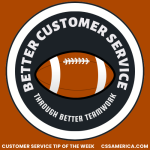I’ve led enough sessions with clients on continuous improvement topics to have solid experience on how to lead ideation exercises, brainstorming to develop new ideas. Oftentimes these sessions start with the right question; the first answers may not be the ultimate solution, but they can serve as a jumping off point for deeper/better ideas from participants.
Brainstorming as an individual isn’t quite as easy an exercise, but it’s something that can create similar outcomes. If you’re trying to identify ways that you can improve yourself and your role in customer service, it really helps to be asked the right questions. So hopefully some of the following questions – and particularly your answers to these questions – will help you to find ways that you can be just a little bit better in the future than you are today:
If you had 2 free hours and could do anything possible to uncover ways to better your performance, what great customer service companies would you research? What co-workers would you shadow? What team members would you sit down with to just tap their brains for ideas and best practices?
How could you improve your communication skills? Become a better listener? Communicate more concisely and specifically? Become more empathetic of the other person’s situation?
If you had available financial resources or funding, what training or webinars or books or workshops would you engage with to learn?
What are the 3 aspects of customer service where you are best? What can you do to get better?
What are the 3 aspects of customer service where you have the least experience or you’re not quite as strong? Who or what can you engage with to get better at those 3 specific topics?
Maybe these questions lead you to one or two ideas that you can take action on to improve. Maybe these questions lead you to 8-10 different ideas. Either way, answer these questions to identify opportunities to improve.
Take a few minutes to brainstorm by yourself to find ways to better yourself.
Signup for FREE Tips! Contact Us More Resources for You Visit Our Home Page
























